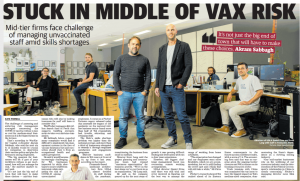
Increasingly, coaching conversations with our clients turn to introspection on ‘what can I do about the issues we encounter in the workplace?’ As business coaches working in many different businesses and organisational structures, we pick up trends and flows on the ‘issues’ discussed, and in the post Covid environment, leaders’ uncertainty about how to go about creating a connected workplace seems to be trending high.
In one way, this is not much different to pre-2019 coaching work. Leadership have always been aware of the role they play in connecting teams and engaging the workforce and keen to build on this. Our ‘most in-demand’ workshop is creating an environment for high performance, where teams are willing to have the difficult conversations and commit to one another. So why the uncertainty in leaders now?
Workplaces have a new level of complexity for leadership to contend with. There are additional layers, to how organisations and teams work together:
- WFH: ‘working-from-home’ for 2 of 5 days, has become a normal part of the working week, which creates a disconnect, both systemically and intra-team – the hybrid workplace, as we now know it.
- All-change: There is also a significant movement of staff – from one company to another, and/or one team or cohort to another which started when the Covid lockdowns and mandates were introduced but has continued to increase as we return to ‘normal’.
- Uncertainty: With a changing and unpredictable workplace, the focus has moved to efficiency and covering the gaps – trying to ‘read-the-tea-leaves’ whilst building for tomorrow and keeping a streamlined organisation together.
How leaders manage this is not a simple, one-size fits all answer. There is however a common coaching technique we apply, when the answer isn’t clear or certain – it is called ‘the overview effect’. My business partner Ak Sabbagh introduced me to this concept a while ago. He explains it this way:
“It is about stepping back and taking an unfamiliar perspective. In many ways the role of a business coach is to help business owners and leadership teams gain ‘the overview effect’. We regularly get comments like “I’ve never seen my business from this angle before.” “It’s like the fog’s been cleared…”
How do we do this? We use a coaching style to help our clients sit above it all and consider the context of their situation – rather than sitting in the situation itself. We use proven frameworks and tools to engage in discussions that elevate our client’s perspective of their ‘fixed workplace’, or the limitations of the team, to look at processes, leadership and communication styles, people, goals and aspirations. We are always innovating new approaches to help our clients get the “overview effect”, to see a solution that was there, but they couldn’t see it because they were standing too close to see it.
Why do we do this? Because, regardless of the size or style of their business, we love working with leadership to build resilient relationships and innovative workplaces, that retain staff, get the right people in the right job and connect the passion of the individual to the purpose of the organisation.
~ Margaret Armitage













